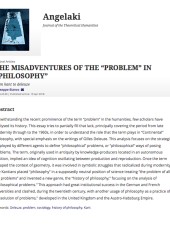The Misadventures of the "Problem" in "Philosophy"
Giuseppe Bianco, "The Misadventures of the "Problem" in "Philosophy"", in Angelaki. Journal of the Theoretical Humanities, Vol. 23, 2018, pp. 8-30
Abstract
Notwithstanding the recent prominence of the term “problem” in the humanities, few scholars have analysed its history. This essay tries to partially fill that lack, principally covering the period from late modernity through to the 1960s, in order to understand the role that the term plays in “Continental” philosophy, with special emphasis on the writings of Gilles Deleuze. This analysis focuses on the strategies employed by different agents to define “philosophical” problems, or “philosophical” ways of posing problems. The term, originally used in antiquity by knowledge-producers located in an autonomous position, implied an idea of cognition oscillating between production and reproduction. Once the term escaped the context of geometry, it was involved in symbolic struggles that radicalized during modernity. The Kantians placed “philosophy” in a supposedly neutral position of science treating “the problem of all the problems” and invented a new genre, the “history of philosophy,” focusing on the analysis of “philosophical problems.” This approach had great institutional success in the German and French universities and clashed, during the twentieth century, with another usage of philosophy as a practice of “dissolution of problems,” developed in the United Kingdom and the Austro-Habsburg Empire.
|
|
|
Social and Vital Norms: the intellectual itinerary of Georges Canguilhem 01 October 2014 - 30 June 2015 |
|
|

